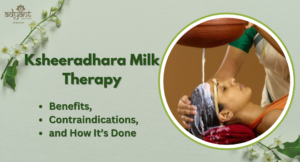Table of Contents
Toggle🔬 Understanding Diabetes in Ayurveda – What is Madhumeha?
In Ayurveda, diabetes is referred to as Madhumeha, a type of Prameha (urinary disorder), described in classical texts like Charaka Samhita and Ashtanga Hridaya.
🖊 “शर्करायां मधु स्रवति यस्मिन् तं मधुमेहं प्रचक्षते।”
(Charaka Samhita, Chikitsa Sthana 6.4)
“When urine becomes sweet like honey, the condition is termed Madhumeha.”
Ayurvedic Classification:
- Sahaja Madhumeha – Congenital or genetic (similar to Type 1 or MODY)
- Apathyanimittaja Madhumeha – Lifestyle-induced (similar to Type 2 diabetes)
Prameha & Madhumeha Context:
Ayurveda classifies 20 types of Prameha:
- 10 Kapha-dominant types
- 6 Pitta-dominant types
- 4 Vata-dominant types
Madhumeha is the most severe Vataja Prameha, often a neglected or advanced stage of the other types.
🖊 “सर्वेषां प्रमेहाणां अन्ते मधुमेहः जायते।”
(Charaka Samhita, Chikitsa Sthana 6.57)
Madhumeha as a Yapya Roga (Manageable, Not Curable):
🖊 “मधुमेहं याप्यं रोगं”
(Charaka Samhita, Chikitsa Sthana 6.57)
Madhumeha is a Yapya Roga, which means it can be managed but not completely cured.
🖊 “While Madhumeha may not have a definitive cure, Ayurveda empowers you to reverse its course through discipline, detox, and deep healing.”
🖊 “न हि प्रमेहः क्षणेनैव प्रशाम्यति। यत्नतो याप्यते दीर्घकालं चोपशाम्यति॥”
“Prameha (diabetes) does not subside instantly. With persistent effort, it can be managed over time.”
🔍 Ayurvedic Diagnostic Approach
At Adyant Ayurveda, diagnosis is individualized using:
- Nadi Pariksha (pulse diagnosis)
- Mutra Pariksha (urine examination)
- Prakriti and Vikriti Analysis (constitution and imbalance detection)
This enables precise identification of doshic imbalance and disease stage, allowing highly customized treatment.
🧬 Ayurvedic Pathogenesis (Samprapti Ghataka)
- Doshas Involved: Kapha (primary), Vata, Pitta (secondary)
- Dushyas (Affected Tissues): Meda, Rasa, Rakta, Majja, Mamsa, Lasika
- Agni Dushti: Weak Jatharagni & Dhatvagni
- Srotas Involved: Mutravaha, Medovaha, Raktavaha
- Srotodushti Types: Sanga (obstruction), Atipravritti (excessive flow)
🖊 “प्रमेहिणां च दोषाणां सन्निपातः प्रकीर्तितः।”
(Ashtanga Hridaya, Nidana Sthana 10.1)
🔄 Types of Diabetes and Ayurvedic Approach
| Diabetes Type | Ayurvedic Approach |
|---|---|
| Type 2 Diabetes | Detox Kapha, enhance Agni, restore metabolism |
| Type 1 Diabetes | Rasayana for pancreas and immune support |
| Prediabetes | Prevention with diet, lifestyle, and herbs |
| Gestational Diabetes | Gentle detox, hormone balance |
| Type 3c Diabetes | Address pancreatic inflammation |
| LADA / MODY | Immune modulation, Vata-Pitta balancing |
🌬️ Panchakarma Therapies for Diabetes at Adyant Ayurveda
🏆 Purva Karma (Preparatory Phase)
- Snehana – Internal & external oleation
- Swedana – Herbal steam to loosen toxins
🌿 Pradhana Karma (Main Panchakarma Therapies)
| Therapy | Benefits |
| Virechana | Detoxifies liver & pancreas, improves insulin sensitivity |
| Basti | Regulates Vata, relieves neuropathy, boosts energy |
| Udvarthanam | Reduces fat, stimulates lymphatic flow |
| Abhyanga | Relieves stress, balances Vata-Kapha |
| Nasya | Hormonal regulation via the hypothalamic-pituitary axis |
| Swedana | Opens channels, enhances microcirculation |
| Raktamokshana | Blood purification reduces ulcers, skin complications |
| Lekhana Basti | Best for diabetic obesity and stubborn Kapha |
🖊 “शुद्धात्मेन्द्रियसत्त्वात्मा सुखं जीवति मुक्तभिः।”
(Charaka Samhita, Sutra Sthana 16.27)
📌 Nidana Parivarjana – Eliminating Root Causes
A key principle in Ayurvedic management is Nidana Parivarjana, which means eliminating the root causes. This includes:
- Avoiding a sedentary lifestyle
- Reducing intake of sweets, dairy, and fried foods
- Managing stress, irregular sleep, and meal timings
🌾 Paschat Karma (Post-Treatment Phase)
- Rasayana Herbs: Amalaki, Ashwagandha, Shilajit, Shiva Gutika
- Supportive Regimen: Diet, daily routine (Dinacharya), and lifestyle counselling
🍽️ Recommended Diet & Lifestyle
✅ Include:
- Bitter gourd, turmeric, barley, horse gram
- Leafy greens, methi, cinnamon, Triphala
- Herbal teas with Guduchi or Amla
❌ Avoid:
- White sugar, maida, fried & processed food, dairy
🖊 “हितभुक् मितभुक् शीतभुक् जितेन्द्रियः।”
“Eat wholesome, moderately, and with discipline.”
🌿 Ayurvedic Herbs & Classical Formulations
| Herb / Medicine | Action |
| Guduchi | Immunity booster, sugar regulator |
| Vijaysar | Hypoglycemia; reduces glucose absorption |
| Karela | Acts like natural insulin |
| Fenugreek | Enhances carbohydrate metabolism |
| Turmeric | Anti-inflammatory, balances blood sugar |
| Bhumyamalaki | Antioxidant, supports liver health |
| Mamejjaka Vati | Classic herb for Prameha and Madhumeha |
| Chandraprabha Vati | Diuretic, reduces inflammation, urinary issues |
| Triphala Guggulu | Detox supports weight loss |
| Nisha Amalaki Churna | Detox and sugar-regulating combination |
| Vasant Kusumakar Ras | Rasayana for neuropathy and fatigue |
🌿 Additional Rasayana Herbs for Complications
| Herb | Use Case |
| Mandukaparni | Cognitive function, nerve rejuvenation |
| Yashtimadhu | Antioxidant, strengthens immunity |
| Bala Churna | Strengthens nerves, counters fatigue |
🏋️ Clinical Outcome: Case-Based Results at Adyant Ayurveda
| Parameter | Before Treatment | After 1 Month | After 3 Months |
| Fasting Blood Sugar | 276 mg/dl | 158 mg/dl | 130 mg/dl |
| Post-Prandial Sugar | 294 mg/dl | 220 mg/dl | 150 mg/dl |
| HbA1c | 14.8% | 8.1% | 6.05% |
📊 Vata’s Role in Diabetic Complications
Vata aggravation in diabetes leads to:
- Neuropathy
- Retinopathy
- Fatigue
- Sexual debility
Therapies like Basti, Nasya, and Rasayana are essential to balance Vata and nourish Majja Dhatu and Ojas.
🗂️ Stage-wise Management Plan at Adyant Ayurveda
| Stage | Ayurvedic Goal | Key Therapies |
| Early (Prediabetes) | Improve Agni, remove Ama | Deepana, Langhana |
| Middle (Type 2) | Detox Kapha, restore Ojas | Virechana, Basti, Rasayana |
| Complicated Cases | Vata-pacification, rejuvenate | Lekhana Basti, Nasya, Shiva Gutika |
🧘♂️ Yoga for Diabetes
- Dhanurasana – Stimulates the pancreas
- Paschimottanasana – Aids digestion
- Surya Namaskar – Improves metabolism and energy
🏥 Why Choose Adyant Ayurveda?
- 4 centers in Bangalore: Jayanagar, Indiranagar, Kalyan Nagar, RR Nagar
- 24+ years of clinical experience
- Awarded Excellence in Panchakarma – Times Health
- Team of experts in diabetes, skin, and metabolic disorders
👨⚕️ Meet Our Expert Doctors
- Dr. Shree Lakshmi – Jayanagar (Diabetes & Panchakarma)
- Dr. Sumana Patvardhana – Indiranagar (Skin & Metabolism)
- Dr. Vidya – Kalyan Nagar (Chronic diseases)
- Dr.Dr. Manasa Srinivas– RR Nagar (Detox & rejuvenation for Diabetes)
🙋 Frequently Asked Questions (FAQs)
What is Panchakarma, and how does it help with diabetes?
Panchakarma is a five-fold Ayurvedic detoxification therapy that eliminates toxins, balances doshas, strengthens metabolism, and rejuvenates vital organs like the liver and pancreas.
Can Ayurveda cure diabetes completely?
No. Madhumeha is considered a Yapya Roga in Ayurveda—manageable but not curable. However, Ayurvedic therapies and lifestyle changes can significantly reverse the disease’s progress.
How soon can I expect results with Ayurvedic diabetes treatment?
Many patients report improvements within 2–4 weeks. Chronic cases may take 2–3 months for sustained changes.
Is Panchakarma safe for older adults?
Yes, treatments are tailored according to Prakriti (constitution) and age. Rejuvenative therapies ensure safe detoxification for seniors.
Can I stop taking allopathic medicines after Ayurvedic treatment?
Possibly, but only under careful supervision of both your Ayurvedic doctor and allopathic diabetologist. Gradual tapering is advised.
Will Ayurvedic treatment help with diabetic neuropathy or retinopathy?
Yes. Therapies like Basti, Nasya, and Rasayana are effective in managing nerve pain, vision issues, and chronic fatigue.
Is Ayurvedic therapy safe during pregnancy for gestational diabetes?
Only mild therapies like Abhyanga, herbal teas, and diet modifications are recommended, all under expert supervision.
What is the cost of Ayurvedic diabetes treatment at Adyant Ayurveda?
Packages start from ₹14,000. The final cost depends on the condition’s chronicity, therapies needed, and duration.
Do I need to take Ayurvedic medicines after completing Panchakarma?
Yes, but in smaller, maintenance doses. Rasayana medicines are used to sustain the benefits and support sugar control.
Can Ayurveda prevent diabetes in high-risk individuals?
Absolutely. Panchakarma and proper lifestyle regimens can improve insulin sensitivity and prevent disease progression in those with a family history or obesity.
Are there any side effects of Panchakarma?
When done under professional guidance, Panchakarma is safe. Temporary fatigue or mild detox symptoms may occur.
How often should I undergo Panchakarma for diabetes management?
A short detox every 6 months or a full Panchakarma once a year is recommended for sustained control.
What is Rasayana therapy, and why is it important?
Rasayana means rejuvenation. It restores Dhatus, strengthens immunity, and maintains long-term metabolic balance post-detox.
Can Panchakarma help with obesity caused by diabetes?
Yes. Lekhana Basti, Udvarthanam, and Virechana are effective in reducing excess fat and improving insulin resistance.
How do I start my Ayurvedic diabetes treatment at Adyant?
Call 9972541009 or download the AyurCare App from the Play Store to book your consultation and personalized treatment plan.
✨ Patient Testimonials
“I reversed my prediabetes in just 30 days. No more meds!”
– Manju, Rajarajeshwari Nagar Branch
“Dr. Shree Lakshmi’s Panchakarma plan improved my energy and removed my neuropathy pain.”
– Kiran Rao, Jayanagar Branch
🌿 Final Thought
Panchakarma is not just a detox—it’s a metabolic reboot. It removes root causes, revives digestive fire (Agni), and restores physical and mental well-being.
🖊 “आरोग्यं परमं भाग्यं।”
“Health is the ultimate fortune.”
🔗 Quick Links
- Panchakarma Treatment at Adyant
- Basti Therapy Info
- Udvarthanam Therapy
- 📲 Download the AyurCare App
- 📞 Call: 9972541009
📌 This blog is written by Dr. Shree Lakshmi, BAMS – Senior Ayurvedic Physician with 25 years of experience and Medical Director of Adyant Ayurveda, Jayanagar Branch.
⚠️ Disclaimer
All treatments at Adyant Ayurveda are conducted by licensed BAMS, MD physicians. Integrative care is supported alongside conventional medicine, ensuring safety and holistic wellness.
📚 References
Charaka Samhita – Chikitsa Sthana, Chapter 6 (Prameha Chikitsa)
👉https://www.carakasamhitaonline.com/index.php?show=chapter&book=Chikitsa%20Sthana&chapter=6Ashtanga Hridaya – Nidana Sthana, Chapter 10 (Prameha Nidana)
👉 https://www.astangahridayam.com/nidana-sthana/chapter-10/Bhavaprakasha Nighantu (Herbal Descriptions)
👉 https://niimh.nic.in/ebooks/eNighantu_Bhavaprakasha.pdf
(Published by CCRAS – Ministry of AYUSH, Government of India)





